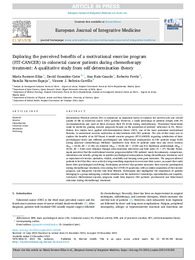Please use this identifier to cite or link to this item:
https://hdl.handle.net/11000/33008Full metadata record
| DC Field | Value | Language |
|---|---|---|
| dc.contributor.author | Romero-Elías, María | - |
| dc.contributor.author | González-Cutre, David | - |
| dc.contributor.author | Ruiz-Casado, Ana | - |
| dc.contributor.author | Ferriz, Roberto | - |
| dc.contributor.author | Navarro-Espejo, Natalia | - |
| dc.contributor.author | Beltrán-Carrillo, Vicente J. | - |
| dc.contributor.other | Departamentos de la UMH::Ciencias del Deporte | es_ES |
| dc.date.accessioned | 2024-09-06T11:54:11Z | - |
| dc.date.available | 2024-09-06T11:54:11Z | - |
| dc.date.created | 2023-12-23 | - |
| dc.identifier.citation | European Journal of Integrative Medicine, Volume 65 , January 2024 | es_ES |
| dc.identifier.issn | 1876-3839 | - |
| dc.identifier.issn | 1876-3820 | - |
| dc.identifier.uri | https://hdl.handle.net/11000/33008 | - |
| dc.description.abstract | Introduction: Physical activity (PA) is considered an important factor to enhance the survival rate and overall quality of life in colorectal cancer (CRC) patients. However, a small percentage of patients comply with PA recommendations and most of them decrease their PA levels during chemotherapy. Theoretical frameworks could be useful for guiding exercise programs focused on the promotion of patients’ adherence to PA. Nevertheless, few studies have applied self-determination theory (SDT), one of the most prominent motivational theories, to understand exercise motivation in interventions with CRC patients. The aim of this study was to explore the benefits of an SDT-based 6-month exercise program (FIT-CANCER) regarding satisfaction of basic psychological needs and different psychological and behavioural consequences in CRC patients (stage II-III) during adjuvant chemotherapy. Methods: Qualitative data from 16 patients (nine men and seven women; Mage = 64.00, SD = 11.58), six relatives (Mage = 55.00, SD = 15.09) and five healthcare professionals (Mage = 40.40, SD = 9.66) were obtained through semi-structured interviews and field notes (N = 27). Results: Participants perceived that the motivational exercise program satisfied CRC patients’ needs for autonomy, competence, relatedness and novelty, giving rise to positive psychological consequences during chemotherapy treatment, such as enjoyment of exercise, optimism, vitality, sociability and keeping some good memories. The program allowed patients to feel that they were actively doing something important to overcome their cancer, an aspect that could foster their psychological well-being. Participants perceived that patients increased their exercise participation during chemotherapy treatment, even during the COVID-19 pandemic, with an online adaptation of the exercise program, and integrated exercise into their lifestyle. Participants also highlighted the importance of patients belonging to a group undergoing a similar situation and the instructor’s knowledge, specialization and empathy. Conclusion: Motivational exercise programs could help improve CRC patients’ psychosocial and behavioural outcomes during chemotherapy treatment. | es_ES |
| dc.format | application/pdf | es_ES |
| dc.format.extent | 10 | es_ES |
| dc.language.iso | eng | es_ES |
| dc.publisher | Elsevier | es_ES |
| dc.rights | info:eu-repo/semantics/openAccess | es_ES |
| dc.rights | Attribution-NonCommercial-NoDerivatives 4.0 Internacional | * |
| dc.rights.uri | http://creativecommons.org/licenses/by-nc-nd/4.0/ | * |
| dc.subject | Exercise | es_ES |
| dc.subject | Chemotherapy | es_ES |
| dc.subject | Colorectal cancer | es_ES |
| dc.subject | Motivation | es_ES |
| dc.subject | Well-being | es_ES |
| dc.subject.other | CDU::7 - Bellas artes::79 - Diversiones. Espectáculos. Cine. Teatro. Danza. Juegos.Deportes | es_ES |
| dc.title | Exploring the perceived benefits of a motivational exercise program (FIT-CANCER) in colorectal cancer patients during chemotherapy treatment: A qualitative study from self-determination theory | es_ES |
| dc.type | info:eu-repo/semantics/article | es_ES |
| dc.relation.publisherversion | https://doi.org/10.1016/j.eujim.2023.102328 | es_ES |

View/Open:
19 RediUMH VJBC.pdf
526,2 kB
Adobe PDF
Share:
.png)
